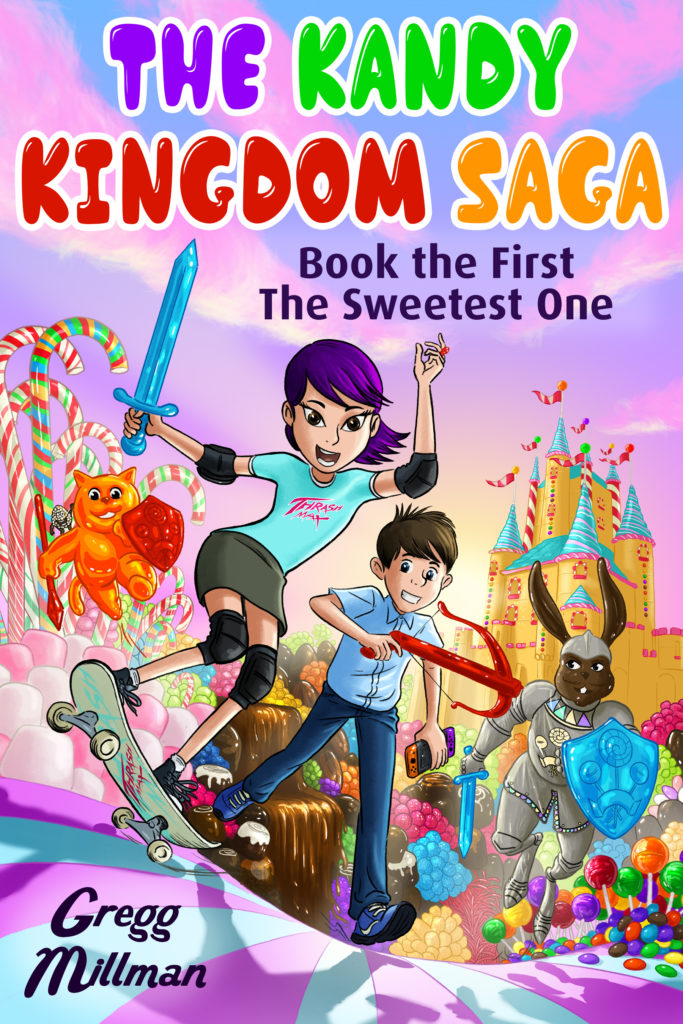Especially for writers starting out, day jobs are essential. Sometimes those jobs can feel like a drain–of energy, of creativity, of joy. But often, skills you develop on the job can actually help with your writing. This series, comprised of interviews and posts from authors for children, focuses on how non-writing work has helped writers with their craft. We hope you might glean some craft tidbits from their experiences and that you might look for how your other interests enrich your writing. –KidLit Craft
by Gregg Millman
When “The Breakfast Club” came out, I saw it two nights in a row and would’ve gone again if my parents had let me. John Hughes and the Brat Pack flicks kickstarted my lifelong obsession with teen pop culture, and years later, I wound up writing screenplays for teen movies and TV shows.
Basically, I went from a teenager dreaming I could be a character in a John Hughes film to an adult dreaming I could actually be John Hughes. Alas, neither dream came true.
Now I have two kids, and I read Middle Grade novels with my 9-year-old son every night. So I thought it’d be cool to take one of my screenplay ideas and turn it into a book series that my son would want to read.
Some of the things I learned while writing screenplays helped while writing my first novel. The kind of stuff you read about in “how to write a screenplay” books: character development, story structure, thematic focus, etc. But a lot of the things I learned while pitching and selling screenplays helped me just as much, if not more.
Why You?
When you’re pitching your TV show to network executives, they often ask the same question: what’s your personal connection to the pitch? Why are you the perfect person to tell this story? Sometimes, you might not have a good answer off-the-bat. Maybe it just seemed like a cool idea for a movie.
But if you dig a little deeper, you can usually find a reason why you sparked to this idea. Maybe it’s reminiscent of a specific childhood experience you had. Or maybe the story is nothing like your childhood because it’s about something you only dreamed of as a kid. Figuring out your personal connection to the story can help focus and deepen the emotional power of the story as you craft it.
I saw WILLY WONKA & THE CHOCOLATE FACTORY (the original movie, with Gene Wilder) when I was a little kid at summer camp, and it scared the hell out of me. Those Oompa Loompas were so damn creepy. The main kid, Charlie, was extremely poor, his father was dead, and his grandparents were sick. On the factory tour, all the other kids end up dying super-grisly deaths. And don’t get me started on that “scary tunnel” scene (Bravo ranked it in the top 100 Scariest Movie Moments). It’s a dark, dark movie about a supposedly fun world of candy. That stuck with me, and I wanted to create something that would capture the imagination of my son in the same way.
Think Big. Cut Through the Clutter.
Remakes, prequels, sequels, spinoffs, franchises. Movies and TV shows based on comic books that were based on a video game that was based on a toy. Feels like it’s harder than ever to sell an original story. To cut through all the noise, you need something high-concept and memorable.

So when you’re coming up with a pitch, you try to find that “Big Idea.” A new twist on something old. A fresh take on a played-out genre. A mashup of two unexpected things.
When I decided to write a kids novel, I reread my old ideas, scrapped pitches, and semi-written scripts. I came across an animated series concept about two kids who get transported to a real world of candy in an alternate dimension. Inspired by Willy Wonka, I thought it’d be interesting to take the concept of a “sweet,” innocent world of candy and turn it on its head. The Kandy Kingdom may be a bright, candy-colored world, but it’s also a dangerous, deadly place, torn apart by war, where the main characters could actually die.
A Pitch is a Focus Group.
In a pitch meeting, you get about thirty minutes to bring the story to life. So you have to come up with the most efficient and impactful way of telling the story. And when you’re done, you get feedback on the spot. They might ask a lot of questions, or they might say nothing (which can also tell you something).
But you’ll have feedback you can use to reshape the story for the next meeting. Each time you pitch the project, you tell it slightly differently. Add a character detail here, remove a plot-point there. The pitch changes, evolves, and hopefully improves.
When I was writing my novel, I wasn’t pitching it to high-powered studio executives. But I ended up talking to my son about the book. Every night, I would update him on what progress I had made. Ask him questions about things I was stuck on. Pitch him different ideas. He’d give honest feedback and suggest his own ideas. And just like when pitching studio executives, I took all of his suggestions and criticisms seriously, considering each and every one. After all, he’s my target demo, and it was like having my very own focus group in real time.
You’re a Brand. Stick to It.
It’s a lot easier to convince producers and execs to buy your ideas when everything adds up. If you’re pitching a lighthearted rom-com, but you’re deadly serious in the meeting, and your writing samples are weird sci-fi scripts, and you mention that you love to watch gritty war movies, the execs are just confused. Um, like, what’s your brand?
But if you’re pitching a teen soap, and you’re high-energy and chatty, like one of the characters in your show, and your writing samples are YA dramas, and you mention that you love to watch the latest Netflix teen flick, then it all makes sense. They get your brand.
Like most new writers, I didn’t initially grasp the importance of having a brand. I started off writing silly animated scripts. Then I got some jobs on network dramas, so I began writing medical and cop shows. When LOST came out, I got obsessed and wrote a bunch high-concept, sci-fi scripts. At one point, I even wrote a historical drama about student radicals in the 70’s.
I was all over the place. When managers and agents read my samples, they didn’t know what to think. After awhile, I sold some teen projects, like a TV soap about a teen psychic and a comedy movie about a disastrous family vacation. Those lead to more teen/tween screenplay sales, which then lead to my Middle Grade novel. That all made sense because: John Hughes.
It can take time to find out what genre you’re good at writing, and what personal spin you want to put on that genre. But the faster the better. ‘Cause then you can focus on honing your craft and building a fanbase.
Pitching Movies is Like Writing Novels…with One Big Difference.
A lot of the things that help when pitching movies can help when writing novels. So before you start cranking away on pages, pitch your idea and see what response you get. Pitch it to friends, family, co-workers. Do it in person, on the phone, by email. Put your idea out there, consider what people say, tweak your pitch, then pitch it again. Wash, rinse, repeat. By the time you start writing, you’ll have a solid base to build from.
But there’s one key difference between pitching movies and writing novels. After a movie pitch, you often have nothing to show for it. Most pitches don’t end up selling, and you’re left with a long, detailed outline for something you’ll never end up writing. But when you finish a novel, you have it forever to send to publishers, sell online, and share with friends and family.

Gregg Millman is a Screenwriter and Novelist who creates movies, TV shows and novels for kids, including a Nickelodeon movie, ONE CRAZY CRUISE. His new fantasy novel for 8-12 year-olds, THE KANDY KINGDOM SAGA, is the first in a series about the adventures of two kids in a magical world of candy. He’s currently working on Book 2.
John Hughes changed lives! John Hughes and Cameron Crowe, personally speaking. Thanks for the advice on aiming for a steady brand. Just found your blog and I thoroughly enjoy it. Thank you
Yes, Cameron Crowe is up there with John Hughes for sure! FAST TIMES and SAY ANYTHING are all-time favs of mine. Thx for the kind words! Aiming for a specific brand might seem annoying at first, but it usually pays off in the long run. Best of luck!